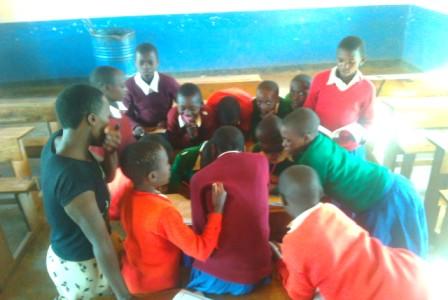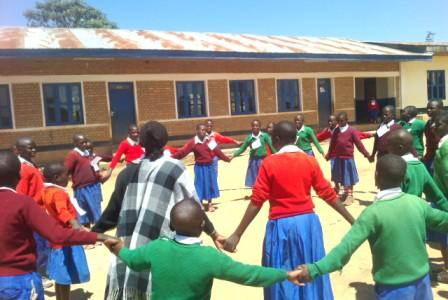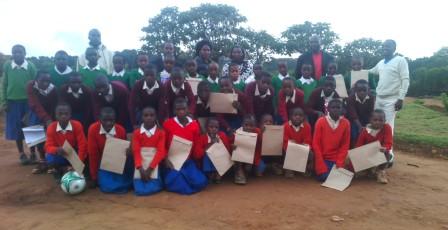Introduction:
The Organization has been conducting the project in pilot schools since 2010 when we started to research assessing the level of understanding and knowledge that primary school students have concerning HIV/AIDS and reproductive health in general.
YPHE program under HHU is now recognized by THE GRAND CHALLENGES PROGRAMS of Canada and McGill University as project principal investigators. On its extension, HHU has been funded to implement the programs in 50 schools of Njombe Region taking sample from different Districts.
SELECTING SCHOOLS
The selection of schools was done in collaboration with District Educational Officers. The list of schools and wards were provided to HHU project implementation team for next procedures.
SELECTING YPHEs AND MENTORS.
After introducing the program to head of schools and Ward Education coordinators the next step was to select the students to be trained as Youth Peer Health Educators in their schools.
Ten students were chosen from each school to make a total of 100 students so as to be trained as YPHEs in their schools.
Primary school head teachers or their representatives helped HHU project implementation team to choose those kids democratically by letting each class to vote for the one whom they think will be their good representatives and their modal.
The section was as follows;
- Two (2) students from grade six,
- Four (4) from grade five
- Four (4) from grade four with equal division of boys and girls.
Head of schools also helped HHU project implementation team to choose teachers who are going to be mentors of YPHEs in schools as they will be running the programs (teaching the peers).
SIGNING CONSENT FORMS WITH PARENTS
Consent forms were provided to selected students to be signed by both YPHEs and their parents on either agreeing or disagreeing to participate in the programs. HHU project implementation team asked the teachers to re select other YPHEs to replace the ones whose parents refused to allow their children to participate in the program.
- MONITORING AND EVALUATION
YPHE program in schools is expected to be sustainable where students will be teaching each other in their normal school activities and any other ways that teachers (mentors) and YPHEs will find to be useful.
For the whole period, project stake holders will be monitoring the project by;
- Visiting schools to meet the YPHEs and mentors to have evaluation discussions.
- Maintaining communication between primary school teachers, ward education coordinators and all project stake holders.
- Conducting get together events where YPHEs and their mentors will be meeting to share experience.
- Any other means of evaluation as will be found to be useful.
- Conduct the ten days training in each school and cover all the topics as it was in a plan.
- Use our 12 trainers to conduct training as a part of their practice.
- Work and be supported by local partners like Kibena Women Association (KWA) and Tanganyika Wattle Co. Ltd (TANWAT) whereby TANWAT supported the project by providing transport for Group “A” YPHEs and KWA supported the project by providing 10 footballs that we are used to give to schools as gifts as well as contributed to provide exercise books to YPHEs during training days.
- Raise information/knowledge concerning health and social education matters.
- Working together with government parastatals in local and regional level
- Carry out YPHEs graduation which was held on 26/12/2014 by means of combining all mentors and YPHEs.
- Generate the sense of belonging on the project in which make the sustainability of it.
- Built self-confidence to YPHEs on mentoring their fellow students.
CHALLENGES:
YPHE project has faced with different challenges during its implementation in those schools.
- Transport
The three schools are located in three different wards and are not close to each other, this has been a challenge because the students were gathered at one school as a training centre on every training day. We were hiring cars to help transferring students and trainers because Highlands Hope Umbrella has no its own car for projects.
- Shortage of fund
The available fund is not enough to cover some of the project needs like travel expenses and communication to project implementation team, gifts to schools, YPHEs and mentors, printing stuffs like t-shirts, labels and brochures.
We had also a plan of running the Radio programs in order to connect parents and what we are doing with YPHEs in schools by having an air time at least once per week. The budget is not able to cover that.
We are inviting different organs, Government and Non - governmental organizations to support us materially and financially for the success of this innovative project. Any contribution will be highly appreciated.
I would like to express our thanks to the following;
- The Grand Challenges Programs - Canada and McGill University
- Bathseba B.B Liduke – HHU director
- Kessy; Regional Aids Coordinator – Njombe Region
- Hannah Hershman – A teacher from St. Georges school Canada
- Royal Orr
- Neema Mkwawa – HHU intern from JHU (2014/2015) and assistant site trainer
- Seth Mbuna – HHU intern from JHU (2014/2015)
- Robert Shejamabu – HHU volunteer and trainer
- McGill University School of nursing Canada
- Head of schools
- Ward Education Coordinators.
- YPHE Trainers (TOTs)
- Njombe T.C; Community development department
Prepared by:
GEORGE MENSON SANGA
YPHE Project Tanzania Site Trainer (TST)


